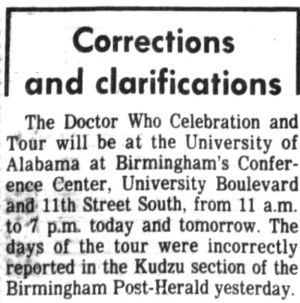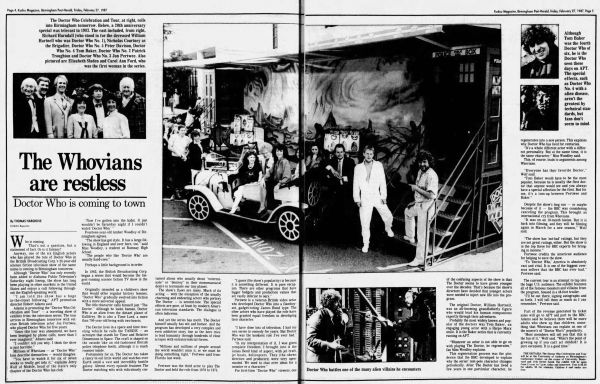The Whovians are restless
- Publication: Birmingham Post-Herald
- Date: 1987-02-27
- Author: Thomas Hargrove
- Page: Kudzu Magazine, p. 4
- Language: English
Doctor Who is coming to town
Who is coming. That's not a question, but a statement of fact. Or is it fantasy?
Anyway, one of the six English actors who has played the role of Doctor Who in the British Broadcasting Corp.'s 24-year-old science fiction television show of the same name is coming to Birmingham tomorrow.
Although "Doctor Who" has only recently been added to Alabama Public Television's Saturday night lineup, the show has long been playing in other markets in the United States and enjoys a cult following throughout the English-speaking world.
"I am told the show has a huge in-the-closet following." APT promotion director Robert Adams said.
Adams is promoting the "Doctor Who Celebration and Tour" — a traveling show of exhibits from the television series. The tour arrives in Birmingham tomorrow with veteran British television actor Jon Pertwee, who played Doctor Who for five years.
"Since this tour was announced, we have been beseiged by phone calls, more than I ever imagined," Adams said.
"I couldn't tell you why. I think the show is just horrible."
Millions of Whovians — as "Doctor Who" fans describe themselves — would disagree.
"You have to watch it for six or seven weeks to really get into it," explains Jerry Wolf of Mobile, head of the state's only chapter of the Doctor Who fan club.
"Now I've gotten into the habit. It just wouldn't be Saturday night if I couldn't watch 'Doctor Who.' "
Fourteen-year-old Amber Woodley of Birmingham agrees.
"The show has got style. It has a large following in England and over here, too," said Miss Woodley, a student at Ramsay High School.
"The people who like 'Doctor Who' are usually hard-core."
Perhaps a little background is in order.
In 1963, the British Broadcasting Corp. began a series that would become the longest-running science fiction TV show in the world.
Originally intended as a children's show that would offer regular history lessons, "Doctor Who" gradually evolved into fiction with a more universal appeal.
The title character calls himself just "The Doctor." Although he looks human, Doctor Who is an alien from the distant planet of Gallifrey. He is also a Time Lord, a more than 700-year-old being with two hearts.
The Doctor lives in a space and time traveling vehicle he calls the TARDIS — an acronym that stands for Time and Relative Dimensions in Space. The craft is shaped on the outside like an old-fashioned British police telephone booth, although it is much roomier inside.
Fortunately for us, The Doctor has taken a fancy to our little world and watches over Earth amid a vast and incredibly hostile galaxy. Almost every episode features The Doctor matching wits with ridiculously costumed aliens who usually shout "exterminate" or "destroy" in their monomaniacal desire to terminate our tiny planet.
The show's flaws are many. Much of its acting — with the exception of the usually charming and endearing actors who portray The Doctor — is second-rate. The special effects are poor, at least by modern American television standards. The dialogue is often ludicrous.
And yet the series has merit. The Doctor himself usually has wit and humor. And the program has developed a very complex and even addictive story line as the hero tries to lead humanity through hundreds of close scrapes with extraterrestrial forces.
"Millions and millions of people around the world wouldn't miss it, so we must be doing something right," Pertwee said from Florida last week.
Pertwee was the third actor to play The Doctor and held the role from 1970 to 1975.
"I guess (the show's popularity) is because it is something different. It is pure escapism. There are other programs that have bigger budgets and production values that are vastly inferior to ours."
Pertwee is a veteran British video actor who developed Doctor Who into a flamboyant, gadget-toting James Bond type. The other actors who have played the role have been granted equal freedom in developing their character.
"I have done lots of television. I had my own series in comedy for years. But Doctor Who was the kookiest role I've ever had," Pertwee said.
"In my interpretation of it, I was given complete freedom. I brought into it the James Bond kind of aspect, with jet craft, jet boats, helicopters. They (the shows directors and producers) were very open-minded. We used to chat over ideas for a monster or a character."
For first-time "Doctor Who" viewers, one of the confusing aspects of the show is that The Doctor seems to have grown younger over the decades. That's because the show's directors have decided that younger actors were needed to inject new life into the program.
The original Doctor, William Hartnell, was an all-knowing grandfatherly figure who would lead his human companions expertly through their adventures.
Probably the most widely known and popular of the doctors was Tom Baker, an engaging young actor with a Harpo Marx smile. It is the Baker series that is currently running on APT.
"Whenever an actor is not able to go on with playing The Doctor, he regenerates," fan Miss Woodley explains.
This regeneration process was the plot device that the BBC developed to explain why the series' tent-pole character changes periodically. After The Doctor has lived a few years in one particular character, he regenerates into a new person. This explains why Doctor Who has lived for centuries.
"It's a whole different actor with a different personality. But at the same time, it is the same character," Miss Woodley said.
This, of course, leads to arguments among Whovians.
"Everyone has their favorite Doctor," Wolf said.
"Tom Baker would have to be the most popular, because he is usually the first doctor that anyone would see and you always have a special affection for the first. But for me, it's a toss-up between Pertwee and Baker."
Despite the show's long run — or maybe because of it — the BBC was considering canceling the program. This brought an international cry from Whovians.
"It was on an 18-month hiatus. But it is back into filming, and they will be filming again in March for a new season," Wolf said.
"The show has 'not-bad' ratings, but they are not great ratings, either. But the show is in the top three for BBC exports for bringing in income."
Pertwee credits the American audience for helping to save the show.
"To 'Doctor Who,' America is absolutely vast and vital. It is one of the biggest overseas sellers that the BBC has ever had," Pertwee said.
The current tour is an attempt to tap into the huge U.S. audience. The exhibit features all of the famous monsters and villains from the program, housed in a 48-foot trailer.
"I'll be out there, signing autographs and so forth. I will tell them as much as I can remember," Pertwee said.
Part of the revenue generated by ticket sales will go to APT and part to the BBC. Adams said he believes there will be more adults who show up than children, something that Whovians can explain as one of the source's of "Doctor Who's" popularity.
"Most members will tell you that this is the fun of it," Wolf said. "What's the point of growing up if you can't act childish? It is pure escapism. It is a good time."
THE DETAILS: The Doctor Who Celebration and Tour will be at the University of Alabama at Birmingham's Conference Center, on the corner of University Boulevard and 11th Street South. The exhibit will be open from l I a.m. to 7 p.m. today and tomorrow. Cost is $6.50 for adults, $5 for students. Children 6 and under are free.
Captions:
The Doctor Who Celebration and Tour, at right, rolls into Birmingham tomorrow. Below, a 20th anniversary special was telecast in 1983. The cast included, from right, Richard Hurndall (who stood in for the deceased William Hartnell who was Doctor Who No. 1), Nicholas Courtney as the Brigadier, Doctor Who No. 5 Peter Davison, Doctor Who No. 4 Tom Baker, Doctor Who No. 2 Patrick Troughton and Doctor Who No. 3 Jon Pertwee. Also pictured are Elisabeth Sladen and Carol Ann Ford, who was the first woman in the series.
Doctor Who battles one of the many alien villains he encounters
Athough Tom Baker was the fourth Doctor Who of six, he is the Doctor Who seen these days on APT. The special effects, such as Doctor Who No. 4 with a alien disease, aren't the greatest by technical standards, but fans don't seem to mind.
Disclaimer: These citations are created on-the-fly using primitive parsing techniques. You should double-check all citations. Send feedback to whovian@cuttingsarchive.org
- APA 6th ed.: Hargrove, Thomas (1987-02-27). The Whovians are restless. Birmingham Post-Herald p. Kudzu Magazine, p. 4.
- MLA 7th ed.: Hargrove, Thomas. "The Whovians are restless." Birmingham Post-Herald [add city] 1987-02-27, Kudzu Magazine, p. 4. Print.
- Chicago 15th ed.: Hargrove, Thomas. "The Whovians are restless." Birmingham Post-Herald, edition, sec., 1987-02-27
- Turabian: Hargrove, Thomas. "The Whovians are restless." Birmingham Post-Herald, 1987-02-27, section, Kudzu Magazine, p. 4 edition.
- Wikipedia (this article): <ref>{{cite news| title=The Whovians are restless | url=http://cuttingsarchive.org/index.php/The_Whovians_are_restless | work=Birmingham Post-Herald | pages=Kudzu Magazine, p. 4 | date=1987-02-27 | via=Doctor Who Cuttings Archive | accessdate=20 January 2026 }}</ref>
- Wikipedia (this page): <ref>{{cite web | title=The Whovians are restless | url=http://cuttingsarchive.org/index.php/The_Whovians_are_restless | work=Doctor Who Cuttings Archive | accessdate=20 January 2026}}</ref>

